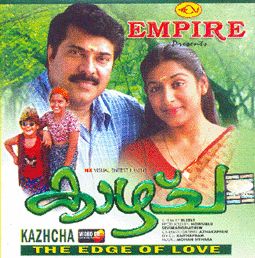Top Qs
Timeline
Chat
Perspective
Kaazhcha
2004 Indian film From Wikipedia, the free encyclopedia
Remove ads
Kaazhcha (transl. Vision) is a 2004 Indian Malayalam-language family drama written and directed by Blessy, in his directorial debut. The story revolves around the boy Pavan (Yash Gawli) who reaches Kerala after he loses everything in the 2001 Gujarat earthquake. Film projectionist Madhavan (Mammootty) happens to meet the boy and takes him with him. The film won three Filmfare Awards South, including the debut of actress Padmapriya.
Remove ads
Plot
Summarize
Perspective
Madhavan, a simple village man who gets bitten by the film bug in his childhood, gives up his studies and finally ends up as a projectionist. He tours the countryside with his 16 mm projector and shows films at temple festivals and other public events. Madhavan's family consists of his wife and a daughter.
Madhavan comes across a six-year-old boy who was displaced from his native land (Gujarat) and separated from his family after the devastating 2001 Gujarat earthquake. He was taken into a gang of beggars from where he managed to escape. Madhavan takes the boy home and cares for him, just like a son. He and his family takes a fondness for the boy, but eventually find out that they cannot adopt the boy legally. The boy is taken away from Madhavan to a juvenile home and allegations of ill treatment is charged on Madhavan, but soon dismissed. The issue gets media coverage.
Madhavan then goes to Gujarat with the boy with hopes of finding his family or adopting him. At the disaster camp in Gujarat, Madhavan understands that the boys relatives are all probably dead but due to legal hurdles, the boy must stay at the camp as there is an expectation that his real parents might be traced. Madhavan, dejected, returns to his family in Kerala.
Remove ads
Cast
- Mammootty as Madhavan
- Padmapriya Janakiraman as Lakshmi ( voice by Bhagyalakshmi )
- Yash Gawli as Pavan a.k.a. Kochundapri
- Sanusha as Ambily
- Manoj K. Jayan as Joy
- Innocent as Fr. Kuriakose
- Augustine as Suresh
- Venu Nagavalli as Magistrate
- Hakim Rawther as man at film club society
- T. S. Raju as Police Officer
- Nedumburam Gopi as Madhavan's father
- Pala Aravindan as Mathai mapla-Film Distributor
- Binda as Old man's daughter
- Vyjayanthi as Sreelatha Menon
Remove ads
Production
Initially, actor Vikram had been considered to play the lead role, who was later replaced by Mammootty.[1] The film marked the debut of Blessy as an independent director, and Padmapriya as actress. It was also the debut of Ranjith Ambady, who was an assistant of Pattanam Rasheed.[2]
Critical reception
Sify gave a verdict "Excellent" saying "The biggest asset of Kazhcha is the story and screenplay by Blessy, (an associate of Lohithadas) which is perfect. Another plus point of the film is the racy way in which the director has been able to tell the story with right mix of comedy and sentiments woven into the plot." The critic praised Mammootty for his "perfect comedy timing", also saying "Mammooty is the heart and soul of the film and he has proved once again that no actor can match up to him in such roles."[3] Rediff ranked Kaazhcha amongst the best films of 2004, writing, "Kaazhcha was different from the majority of films seen over recent years. After a long time, a film was made with an original concept. Blessy's apprenticeship under the late Padmarajan was evident in each frame."
Remove ads
Box office
The film was released onam weekend.Initially it had slow response. But later the film gained popularity and emerged as box office success.[4]
Soundtrack
Except for the song Jugunure, lyrics for all other songs were written by Kaithapram Damodaran Namboothiri, while lyrics for Jugunure were written by K.J.Singh. All songs were composed by Mohan Sithara.
Remove ads
Awards
- Kerala State Film Awards - 2004
- Kerala State Film Award for Best Film with Popular appeal & Aesthetic quality – Kaazhcha
- Kerala State Film Award for Best Debutant Director -Blessy
- Kerala State Film Award for Best Actor – Mammootty
- Kerala State Film Award for Best Child artist – Baby Sanusha & Master Yash
- Filmfare Awards South - 2004[5]
- Best Film – Kaazhcha
- Best Director – Blessy
- Best Actor – Mammootty
- Asianet Film Awards - 2004
- Best Film – Kaazhcha
- Best Actor – Mammootty
- Best New Face of The Year (Female) – Padmapriya
- Best Child artist – Master Yash
- Best Cameraman - Azhagappan[6]
- Others
Remove ads
References
External links
Wikiwand - on
Seamless Wikipedia browsing. On steroids.
Remove ads
